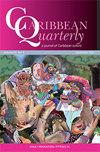“If You Don’t Make Money, Then You Don’t Make Sense”
Q3 Arts and Humanities
引用次数: 0
Abstract
WEALTH IS TYPICALLY CONSTRUCTED AS PROSPERITY AND riches; an abundance of capital – land, cash, material possessions. On investment advice websites, wealth is defined in terms of assets and income.1 Wealth is a tangible concept that allows for growth: when you have wealth, you can generate more. Wealth is also subjective. How an individual constructs wealth is relative to cultural, social, economic and/or personal factors. We are concerned with objective and subjective constructions and representations of wealth in a sample of popular Jamaican music and its reflection of a historically rooted, ongoing colonial context that underlines the value of capital over all else. The statement “If you don’t make money, then you don’t make sense” is found in Mavado’s “Box a Money”2 and is one to which many Jamaicans and non-Jamaicans, rich and poor, can relate. In our deeply capitalist society, it is widely known and accepted that economic wealth is closely tied to social standing because it provides one with access to power. The influence of capitalism is rife throughout Jamaica’s history. With power, one has voice, agency and the ability to control one’s fate, the fate of loved ones as well as strangers. Wealth is, then, a marker of inclusion within society. This is why the concept of “sense” is also significant. Without wealth, one does not “make sense” as a member of society. Wealth provides one with access to “sense making” – rational thought that buys access to recognition as well as to power, progress and development. Social value or ability to “make sense” to the powers that be is linked to access to economic capital. “Making sense” can then be interpreted as being noticed“如果你赚不到钱,那么你就没有意义”
财富通常被理解为富裕和财富;充足的资本——土地、现金、物质财富。在投资咨询网站上,财富是根据资产和收入来定义的。1财富是一个允许增长的有形概念:当你拥有财富时,你可以创造更多。财富也是主观的。个人如何构建财富与文化、社会、经济和/或个人因素有关。我们关注牙买加流行音乐样本中对财富的客观和主观建构和表现,以及它对植根于历史、持续的殖民背景的反映,这种背景强调了资本高于一切的价值。“如果你不赚钱,那么你就没有意义”这句话出现在马瓦多的《金钱盒子》2中,许多牙买加人和非牙买加人,无论贫富,都能与之联系起来。在我们高度资本主义的社会中,众所周知,经济财富与社会地位密切相关,因为它为人们提供了获得权力的途径。资本主义的影响贯穿牙买加的整个历史。有了权力,一个人就有了发言权、代理权和控制自己命运、亲人和陌生人命运的能力。因此,财富是社会包容的标志。这就是为什么“感觉”的概念也很重要。没有财富,作为社会的一员就没有意义。财富为一个人提供了“创造意义”的途径——理性思维可以获得认可,也可以获得权力、进步和发展。社会价值或对权力“有意义”的能力与获得经济资本有关。“有意义”可以被解释为被注意到
本文章由计算机程序翻译,如有差异,请以英文原文为准。
求助全文
约1分钟内获得全文
求助全文

 求助内容:
求助内容: 应助结果提醒方式:
应助结果提醒方式:


